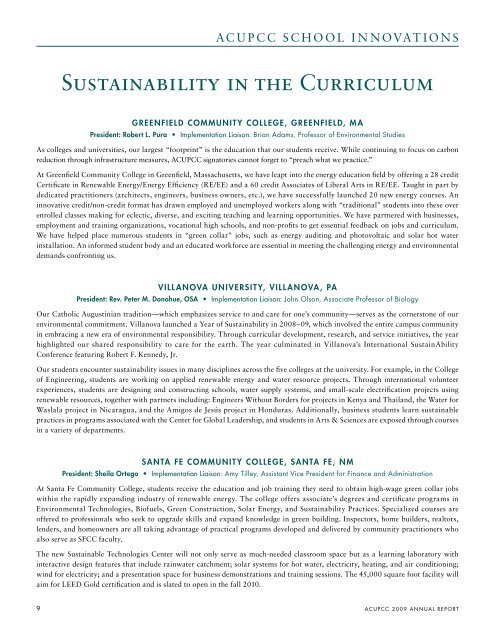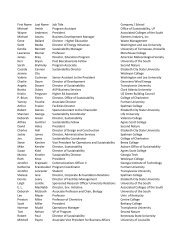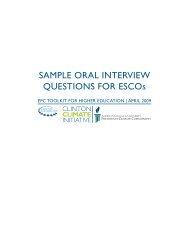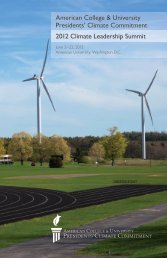ACUPCC 2009 Annual Report - Climate Commitment
ACUPCC 2009 Annual Report - Climate Commitment
ACUPCC 2009 Annual Report - Climate Commitment
You also want an ePaper? Increase the reach of your titles
YUMPU automatically turns print PDFs into web optimized ePapers that Google loves.
Success Stories<br />
Acupcc school innovations<br />
Sustainability in the Curriculum<br />
Greenfield Community College, Greenfield, MA<br />
President: Robert L. Pura • Implementation Liaison: Brian Adams, Professor of Environmental Studies<br />
As colleges and universities, our largest “footprint” is the education that our students receive. While continuing to focus on carbon<br />
reduction through infrastructure measures, <strong>ACUPCC</strong> signatories cannot forget to “preach what we practice.”<br />
At Greenfield Community College in Greenfield, Massachusetts, we have leapt into the energy education field by offering a 28 credit<br />
Certificate in Renewable Energy/Energy Efficiency (RE/EE) and a 60 credit Associates of Liberal Arts in RE/EE. Taught in part by<br />
dedicated practitioners (architects, engineers, business owners, etc.), we have successfully launched 20 new energy courses. An<br />
innovative credit/non-credit format has drawn employed and unemployed workers along with “traditional” students into these over<br />
enrolled classes making for eclectic, diverse, and exciting teaching and learning opportunities. We have partnered with businesses,<br />
employment and training organizations, vocational high schools, and non-profits to get essential feedback on jobs and curriculum.<br />
We have helped place numerous students in “green collar” jobs, such as energy auditing and photovoltaic and solar hot water<br />
installation. An informed student body and an educated workforce are essential in meeting the challenging energy and environmental<br />
demands confronting us.<br />
Villanova University, Villanova, PA<br />
President: Rev. Peter M. Donohue, OSA • Implementation Liaison: John Olson, Associate Professor of Biology<br />
Our Catholic Augustinian tradition—which emphasizes service to and care for one’s community—serves as the cornerstone of our<br />
environmental commitment. Villanova launched a Year of Sustainability in 2008–09, which involved the entire campus community<br />
in embracing a new era of environmental responsibility. Through curricular development, research, and service initiatives, the year<br />
highlighted our shared responsibility to care for the earth. The year culminated in Villanova’s International SustainAbility<br />
Conference featuring Robert F. Kennedy, Jr.<br />
Our students encounter sustainability issues in many disciplines across the five colleges at the university. For example, in the College<br />
of Engineering, students are working on applied renewable energy and water resource projects. Through international volunteer<br />
experiences, students are designing and constructing schools, water supply systems, and small-scale electrification projects using<br />
renewable resources, together with partners including: Engineers Without Borders for projects in Kenya and Thailand, the Water for<br />
Waslala project in Nicaragua, and the Amigos de Jesús project in Honduras. Additionally, business students learn sustainable<br />
practices in programs associated with the Center for Global Leadership, and students in Arts & Sciences are exposed through courses<br />
in a variety of departments.<br />
Santa Fe Community College, Santa Fe, NM<br />
President: Sheila Ortego • Implementation Liaison: Amy Tilley, Assistant Vice President for Finance and Administration<br />
At Santa Fe Community College, students receive the education and job training they need to obtain high-wage green collar jobs<br />
within the rapidly expanding industry of renewable energy. The college offers associate’s degrees and certificate programs in<br />
Environmental Technologies, Biofuels, Green Construction, Solar Energy, and Sustainability Practices. Specialized courses are<br />
offered to professionals who seek to upgrade skills and expand knowledge in green building. Inspectors, home builders, realtors,<br />
lenders, and homeowners are all taking advantage of practical programs developed and delivered by community practitioners who<br />
also serve as SFCC faculty.<br />
The new Sustainable Technologies Center will not only serve as much-needed classroom space but as a learning laboratory with<br />
interactive design features that include rainwater catchment; solar systems for hot water, electricity, heating, and air conditioning;<br />
wind for electricity; and a presentation space for business demonstrations and training sessions. The 45,000 square foot facility will<br />
aim for LEED Gold certification and is slated to open in the fall 2010.<br />
9<br />
<strong>ACUPCC</strong> <strong>2009</strong> <strong>Annual</strong> <strong>Report</strong>





